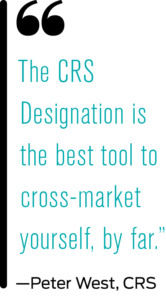Agents with real estate licenses in multiple states have access to even more opportunities to grow their business
By Megan Craig
Guy Lofts, CRS, is a successful REALTOR® with a cozy office in snowy Madison, Wisconsin.
But this past winter, he made most of his business calls from the beach.
Being licensed in Wisconsin allows Lofts, a broker with Real Estate Guy brokered by Real Broker LLC, to keep serving his long-term clients at his home base. Now, after 30 years in the Midwest, he and his partner are testing out Florida and California and plan to license in one of those places, as well.
“We’re not getting any younger. Suffering through five months of winter was really the spark,” he says.
Whether easing into a snowbird retirement, transitioning to a new market, positioning themselves to sell more vacation homes or simply taking advantage of connections across multiple states, many REALTORS®, like Lofts, are making the most of multistate licensing.
Making multiple licenses worth your time
Peter West, CRS, broker owner of Bishop West Real Estate in Venice, Florida, also holds licenses in Massachusetts, Vermont and New York.
West has all those licenses near Massachusetts for one simple reason: Drive 15 minutes from his office there, and you’ll end up in either New York or Vermont. When people look at homes in his area, it wouldn’t be uncommon for them to look in two of the three states, West says.
Florida, although not a bordering state, is a popular destination for snowbirds from New England. When West found an opportunity back in 2005 to do some land deals in the Sunshine State, he made the business decision to get his Florida license. More than 10 years later, another opportunity presented itself with an agent based in Florida and led West and his business partner to open an office there.
“And I’ve been very busy and active in the market since,” he says.
Rob Levy, CRS, a principal broker with Keller Williams Realty Professionals in Portland, Oregon, says he didn’t get a second license to get rich. For him, it was “a lifestyle choice.”
As he and his wife look toward retirement, they thought they might do what so many people do after years in the Pacific Northwest: Look for a sunny spot in Hawaii, Arizona or Palm Springs, California. When Levy made seven referrals to Palm Springs in one year, he realized he should probably stop referring and start selling there.
“I was kind of joking with my accountant one day and said, ‘Hey, if I was a really good REALTOR®, I’d just fly down there and look at houses with them!’ And he told me I could write that off [on my taxes], but he’d rather I have a license there to do it. And the rest is history,” Levy says.
And even though he didn’t only do this to make money, Levy says the shift to working in both Oregon and California has been lucrative thanks to high average home prices in Palm Springs.
West says multiple licensing could work for anyone who regularly visits another state.
“You just have to have a reason—a solid reason—and a desire to go to that other place,” he says. “The rest is just building your business.”
Know whether multistate licensing will work for you
Being licensed in two or more states can be a time-consuming process—taking more classes, studying for more exams, establishing a new office, marketing yourself to a new client base and maintaining those licenses year after year.
It’s not always worth it
Linda Crane, a REALTOR® with Berkshire Hathaway HomeServices, Fox & Roach REALTORS®, and the Trident Group, was based in both Newtown, Pennsylvania, and Pennington, New Jersey. She lives in Pennsylvania but is originally from New Jersey, and because the states border each other, she thought dual licensing would be a masterful move for her business. She’d list the New Jersey homes owned by buyers moving to Pennsylvania (parts of New Jersey are feeder areas to Crane’s area in Pennsylvania).
In the few years that she was licensed in New Jersey, the clients that Crane did sell the homes of moved out of the area completely. In the process, she learned that she much preferred placing her focus on one area.
“Whether helping clients buy or sell homes, whenever possible, I believe that our greatest value comes while offering people specialized attention,” Crane says.
Crane has changed her sales strategy and now prefers to focus on only selling to her Pennsylvania clients while acting as a connector for people located elsewhere—not just in New Jersey, but through referrals to other agents across the country and the world.
Crane’s advice for REALTORS® who want to make multistate licensing work across state borders:
1. Know what you’re getting into. Research each area beyond your primary state so that you’re sure obtaining another license will be worth your investment, time and money.
2. Host open houses in both states. That way, you’ll meet both buyers and sellers from each area, potentially boosting your business. It will also give you exposure to other agents.
3. Target your marketing. Learn which specific areas people are coming from and moving to within your states, and market to those areas specifically rather than trying to do blanket marketing across entire states.
4. Network, network, network. Bond with agents in both states, especially if you work for a company that sells in both places. Other agents can help you become a master of the new area faster. Research and join effective networking groups in both areas.
5. Build up vendor contacts in both places. This will make you look (and feel) more equipped to work with clients across borders.
Marketing to the multistate masses
Although he started selling in Massachusetts and owns homes in both places, West said he now considers Florida his home base—and good thing, since he’s the state’s 2023 RRC president. But he still maintains close ties with his New England clients, continuing to operate an office in Massachusetts.
 “The CRS Designation is the best tool to cross-market yourself, by far,” he says, adding that he always hands out his Florida business card at conventions in the Northeast and his Massachusetts business card at conventions in Florida. That way, people know you’re licensed in a place they may be looking to move, and other REALTORS® know to refer clients to you in those states.
“The CRS Designation is the best tool to cross-market yourself, by far,” he says, adding that he always hands out his Florida business card at conventions in the Northeast and his Massachusetts business card at conventions in Florida. That way, people know you’re licensed in a place they may be looking to move, and other REALTORS® know to refer clients to you in those states.
Portia Green, a principal agent at Compass Real Estate in San Diego, has licenses in both Massachusetts and California. For her, it’s all about maintaining close contacts in both places so your word-of-mouth business booms.
“It’s a small world, as they say,” Green says. “It’s just one more thing you can share to stay top of mind, to essentially just kind of be part of the community from afar. It’s all about keeping in touch with people wherever you are, wherever they are.”
The Second (Or Third) Licensing Process
After she moved to Boston, Portia Green, a principal agent at Compass Real Estate in San Diego, decided to keep her California license. When, 10 years later, she and her fiancé moved back home to California, that license came in handy. But she kept her Massachusetts license, as well.
“I knew I wanted to have that referral avenue, having that experience in real estate and always kind of using both places as touch points,” she says.
Getting licensed in both places was “pretty easy,” she says, however, the real estate laws of the two states—literally on opposite sides of the country—aren’t similar at all. That added the need to study hard for licensing exams in each place but helps Green to keep the rules straight between the two. Since the differences aren’t subtle, she never has to think hard about which rules to follow in which states.
For Peter West, CRS, broker owner of Bishop West Real Estate in Venice, Florida, having years of real estate experience was key to the process, even though some of those states had only partial or no reciprocity. West holds licenses in Massachusetts, Vermont, New York and Florida, and the process was slightly different for each place.
The only way to know exactly what you’ll have to do to get licensed in a new state (and whether it’s worth your time and effort) is to research beforehand, West says.
The good news is, once you’re licensed, a lot of information is similar enough among some states—even those without reciprocity—that keeping licenses in each place is possible without duplicating continuing education classes, says Rob Levy, CRS, a principal broker with Keller Williams Realty Professionals in Portland, Oregon.
“The generic stuff—titling, company information—the classes on those items work for multiple states. So you pay for it in one state and get credit for it in the next state,” Levy says. “You don’t have to do double the hours.”
Is your state real estate license recognized by another state? Check at NAR.realtor/license-reciprocity-license-recognition.
Photo: iStock.com/torwai/Aleksei Iatsenko/ONYXprj








